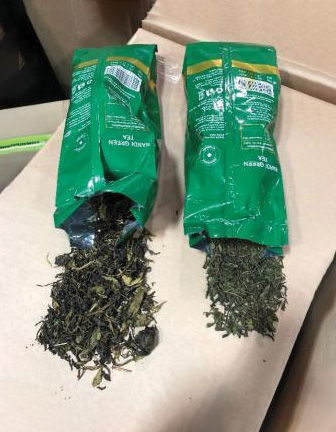
A joint effort between U.S. Homeland Security Agencies, Customs and Border Protection and U.S. Coast Guard within the Port of Seattle has led to the seizure of more than 20,000 dried pounds of the controlled substance khat, with an estimated street value of $3.6 million, CPB officials revealed July 21.
Khat is a plant native in Africa and contains cathinone which causes stimulation and excitement. Its leaves are chewed or dried for tea. Cathinone is known to be very addictive and has been classified as a controlled substance in the United States since 1987.
The seized khat, which was destined for the United States, was shipped from Kenya as dried tea leaves, and is believed to be the largest seizure ever in the Puget Sound area. The seizure occurred in late May, after U.S. Customs and Border Protection officers and U.S. Coast Guard at the Port of Seattle conducted an exam on a container that appeared to contain khat.
The shipment was manifested as dried tea leaves from Kenya and destined to Seattle. Samples were extracted from the container and sent to the U.S. Department of Agriculture for testing. The true nature of the substance was confirmed May 28.
Khat, which is a green, leafy plant, is typically grown in the Arabian Peninsula and many parts of Africa, and is chewed for its stimulant effect. The World Health Organization classified it a drug of abuse in 1980.
In total, CBP officers seized 623 boxes of khat at the port, with a total weight of about 20,215 pounds. CBP said that its officers seized the khat for storage pending destruction.
The Drug Enforcement Administration classifies khat as a Schedule I narcotic—the most restrictive category used by the DEA—when the leaves are freshly picked. Its principal components, cathine and cathinone, are considered controlled substances in the United States.
“Khat remains illegal to import into the United States and CBP officers will continue to seize khat and all illicit substances that pose a threat,” J. Rene Ortega, CBP’s port director for the Seattle port area said in a statement. “Drug interdiction at our nation’s borders is one of many ways in which CBP helps to keep our communities safe.”
CBP routinely conducts enforcement operations on international passengers and cargo and searches for narcotics, unreported currency, weapons, prohibited agriculture, and other illicit products.
“This seizure underscores the importance of inter-agency cooperation,” USCG Sector Puget Sound Commander Capt. Patrick Hilbert said. “The Coast Guard and Customs and Border Patrol frequently train and operate together to safeguard our borders. This success is a direct result of that cooperation.”
